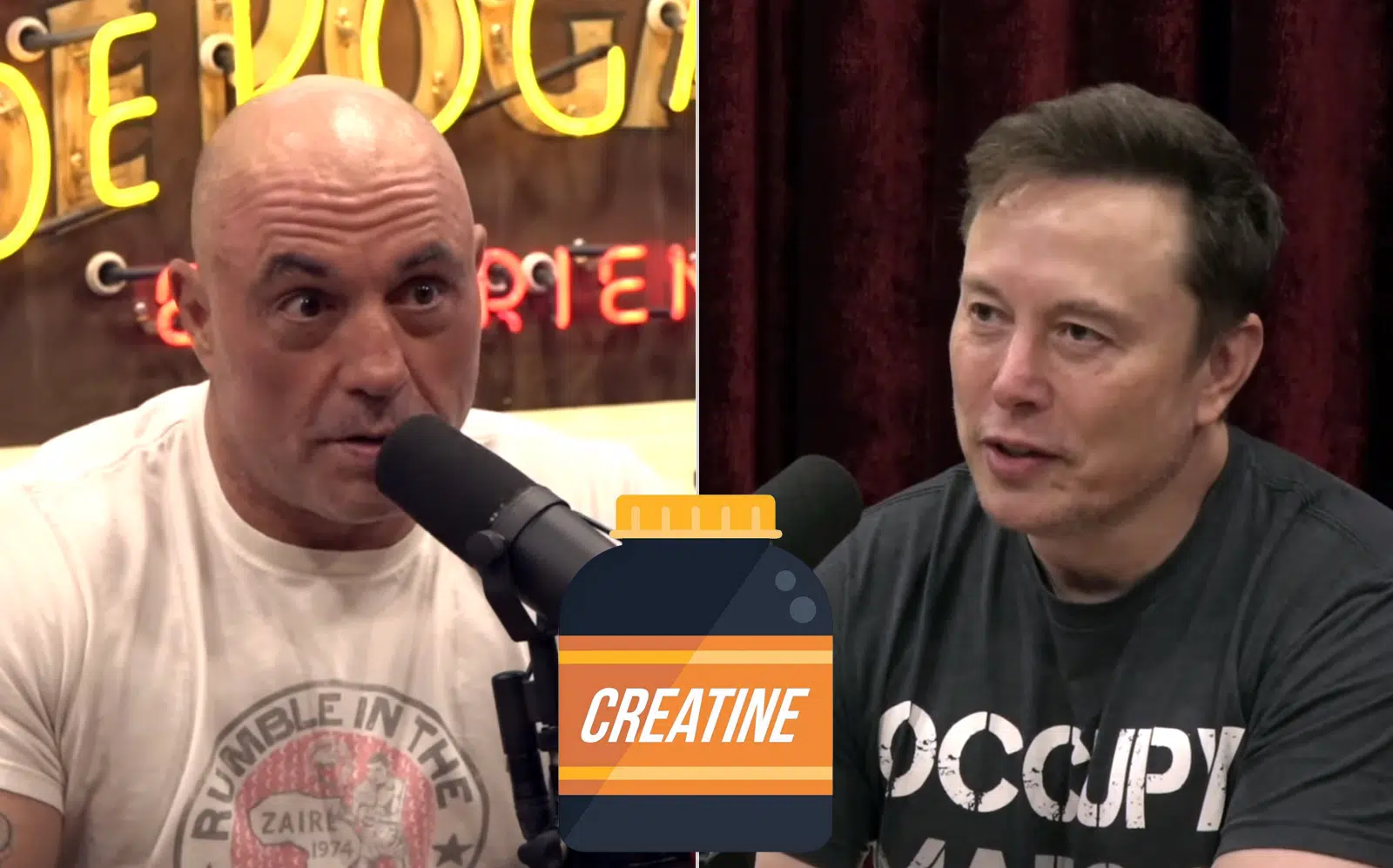In the latest episode of the Joe Rogan Experience, tech mogul Elon Musk sat down with host Joe Rogan to discuss a wide array of topics—from artificial intelligence and space exploration to the nuances of human cognition. Among the intriguing subjects, they explored the surprising cognitive benefits of creatine, a supplement traditionally associated with muscle health and athletic performance.
Musk remarked during their conversation, shedding light on the supplement’s lesser-known effects on brain function:
“Creatine is actually a nootropic, believe it or not,”
Nootropics are compounds that enhance cognitive abilities such as memory, creativity, and motivation. Musk emphasized that creatine isn’t just for bodybuilders but can also be a valuable tool for mental performance:
“It’s not just for bodybuilders; it’s something that can help you think more clearly,”
He added, suggesting that the supplement’s benefits extend well beyond the gym.
Rogan, an advocate for health and wellness supplements, expanded on Musk’s point by referencing scientific studies that highlight creatine’s positive impact on mental clarity and cognitive health:
“There’s a lot of benefits of creatine that are really weird… especially for women,”
He mentioned recent research indicating that creatine supplementation can be particularly beneficial for postmenopausal women:
“Especially for women, for postmenopausal women, it’s very beneficial,”
Pointing out that creatine may help mitigate age-related cognitive decline.
Their discussion aligns with a growing body of research exploring creatine’s role in brain health. Traditionally known for its ability to enhance muscle mass and athletic performance by supplying energy to muscle cells, creatine also plays a crucial role in brain energetics. Studies have shown that creatine supplementation can lead to improvements in:
- Short-term memory: Enhancing the ability to recall information over brief periods.
- Intelligence and reasoning: Supporting tasks that require quick thinking and problem-solving.
- Mental fatigue resistance: Improving endurance during mentally demanding tasks.
A study published in the Proceedings of the Royal Society B demonstrated that vegetarians who supplemented with creatine showed significant improvements in memory and intelligence tests compared to those who did not supplement. This effect is thought to be due to creatine’s role in maintaining ATP (adenosine triphosphate) levels in the brain, which is essential for energy-intensive cognitive processes.
Rogan also addressed common misconceptions about creatine, reassuring listeners about its safety profile:
“It’s a natural part of food, so there are no downsides,”
He explained, emphasizing that creatine is found naturally in foods like red meat and fish. For individuals who may not consume enough creatine-rich foods—such as vegetarians or those with dietary restrictions—supplementation offers a safe and effective way to ensure adequate intake.
Musk added, underscoring the importance of holistic health approaches that consider both physical and mental well-being:
“We often think of it just for fitness, but the brain needs fuel just like muscles do,”
This perspective reflects a broader shift in the health and wellness community toward recognizing the interconnectedness of bodily systems.
Watch the Full Episode of the Joe Rogan Experience with Elon Musk Here:
Their conversation not only highlights the multifaceted benefits of creatine but also encourages a reevaluation of how supplements can play a role in overall health. As more people seek ways to enhance cognitive function—whether for professional demands, academic pursuits, or maintaining mental sharpness with age—creatine emerges as a promising and accessible option.
Key Takeaways from Their Discussion:
- Creatine as a Nootropic: Recognizing creatine’s potential to enhance brain function challenges the traditional view of the supplement solely as a muscle-builder.
- Benefits for Women: The emphasis on creatine’s positive effects for postmenopausal women highlights the supplement’s role in supporting cognitive health during aging.
- Safety and Accessibility: Addressing concerns about safety, both Musk and Rogan reinforce that creatine is a natural, well-researched supplement with a strong safety profile.
- Holistic Health Perspective: The dialogue promotes an integrated approach to health, considering both physical and mental aspects as interconnected and equally important.
Understanding Creatine’s Role in Brain Health
Creatine’s cognitive benefits are linked to its ability to enhance energy availability in brain cells. The brain consumes a significant amount of energy, accounting for up to 20% of the body’s total energy expenditure despite making up only about 2% of body weight. By increasing phosphocreatine stores, creatine supplementation ensures a rapid supply of ATP, the primary energy currency of cells.
Research Supporting Cognitive Benefits:
- A study in Psychopharmacology found that creatine supplementation improved brain function in tasks requiring speed of processing, particularly in individuals under stress or sleep deprivation.
- Research published in Neuroscience Letters indicated that creatine might have neuroprotective effects, potentially benefiting individuals with neurodegenerative diseases like Parkinson’s and Alzheimer’s.
- A trial involving adolescents showed that creatine supplementation led to improved performance in memory and intelligence tests, suggesting benefits across different age groups.
Practical Considerations for Supplementation
For those interested in exploring creatine’s cognitive benefits, consider the following:
- Dosage: Common recommendations for cognitive enhancement align with those for athletic performance, typically around 3-5 grams per day.
- Form: Creatine monohydrate is the most studied and widely used form, known for its efficacy and affordability.
- Timing: While timing may be less critical for cognitive benefits, consistent daily intake is important to maintain elevated creatine stores in the brain.
- Dietary Sources: Individuals who consume less meat, such as vegetarians and vegans, may experience more pronounced benefits due to lower baseline creatine levels.
Conclusion
The enlightening conversation between Elon Musk and Joe Rogan brings to the forefront the expanding understanding of creatine beyond muscle health. As scientific research continues to uncover the depth of creatine’s impact on cognitive function, it stands out as a valuable supplement for those seeking to enhance mental clarity, memory, and overall brain health.
Their discussion serves as a reminder of the importance of staying informed about nutritional science and being open to integrating well-supported supplements into one’s health regimen. As we advance in our understanding of human physiology, such insights empower individuals to make choices that support both body and mind.
Read more about Creatine here:
- Creatine Calculator: Determine Your Optimal Dosage
- Creatine Before and After: What to Expect
- Creatine Pros and Cons: A Comprehensive Guide
Tip: If you're signed in to Google, tap Follow.











